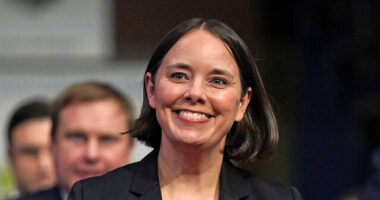Households face a raft of extra local taxes after SNP ministers and council leaders agreed to explore ‘new opportunities’ to raise cash.
A tax ‘empowerment’ plan will see councils exercise ‘greater fiscal powers’ using ‘new fiscal levers in a local setting’.
Potential options under the new ‘Fiscal Framework’ include local income tax, sales taxes and road tolls.
Scottish Conservative local government spokesman Craig Hoy said: ‘Hard-pressed Scots will be deeply alarmed at the prospect of being hammered with more taxes.
‘That appears to be the SNP’s only answer to fill the ever-growing black hole their mismanagement has created in Scotland’s finances.
‘And unless they finally give cash-strapped local councils a fair funding deal, then local authorities will likely use any new tax powers without a second thought.
‘SNP ministers must come clean with Scots and tell them if their bills are going to be hiked yet again.’
Scotland’s 32 local authorities imposed the biggest council tax rises in a generation this year. An average rise of 9.6 per cent saw the typical Band D bill rise by £125 to £1,543.

A tax ‘empowerment’ plan will see councils exercise ‘greater fiscal powers’

Scottish Conservative local government spokesman Craig Hoy slammed the proposals
In recent years, driven by the Scottish Greens, the SNP has given councils the power to impose workplace parking levies and tourist taxes.
Ministers are also considering whether to bring in a Green-led cruise ship levy.
Other local tax options pushed by the Greens, who could re-enter government after May’s Holyrood election, include a local sales tax, a tax on polluting vehicles and locally-set waste disposal taxes and carbon taxes.
Councils could also introduce road tolls and congestion taxes with new powers.
SNP-run Glasgow City Council recently called for the power to toll the Clyde Tunnel to cover its operating costs.
The new Fiscal Framework agreed between the government and council umbrella body Cosla pledges to enhance ‘local fiscal levers and flexibilities through the exploration of new opportunities’.
A ‘structured process of design and evaluation’ will allow Scottish and local government to ‘deliver future opportunities for fiscal empowerment’, it says.
Local taxes should ‘favour local discretion’, maximising council influence on costs.
The Accounts Commission warned in May that councils face a £1billion budget gap across this financial year and 2026-27, because of a lack of funding from the SNP government.
With inflation, pay rises and the demands of an ageing population straining budgets, councils will be tempted to try to balance the books by raising taxes.
In a joint letter to Holyrood’s local government committee last night, finance secretary Shona Robison and Cosla resources spokesman Katie Hagmann said the Fiscal Framework was a ‘first iteration’ of a scheme offering ‘clear routes to explore local revenue raising’.
Councillor Hagmann said: ‘Cosla sees this document as an important mechanism to ensure local government receives fair and flexible funding.’
The Scottish Government was asked for comment.









